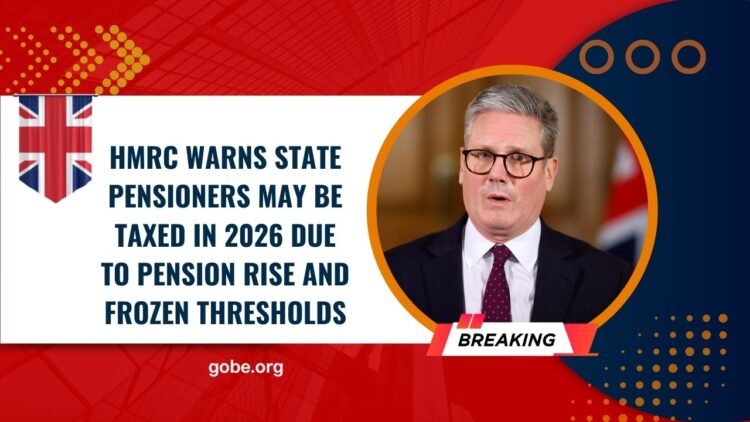The HMRC has issued a clear warning that many UK state pensioners could face income tax bills in 2026 for the first time. This is happening because the triple-lock system is boosting pensions significantly, while the personal tax allowance remains frozen at £12,570 until 2028. As a result, hundreds of thousands of pensioners will see their retirement income cross the tax-free threshold, creating unexpected liabilities.
State Pension Increases and the Tax Risk
The state pension is rising sharply due to the triple-lock formula, which guarantees that payments increase each year by the highest of inflation, wage growth, or 2.5%. For 2025/26, the full new state pension is expected to reach £11,973 annually, which equates to around £230 to £231 per week.
This is dangerously close to the personal allowance threshold, meaning that even a small amount of extra income such as savings interest, part-time work, or private pension payments could trigger tax obligations.
Millions of Pensioners Affected
In 2026, an estimated 8.7 million pensioners are expected to be paying income tax on their retirement income. This marks an increase of 420,000 more pensioners compared to the previous tax year.
When compared with figures from ten years ago, this represents an additional 1.85 million pensioners being pulled into the tax system. The trend shows that unless allowances are raised, the number of pensioners facing tax will continue to grow each year.
Why Fiscal Drag Matters
The combination of frozen tax thresholds and rising pension income is a classic example of fiscal drag. This occurs when incomes rise but tax allowances stay the same, gradually pulling more people into paying tax without any changes in tax rates.
Pensioners are particularly vulnerable because the increase in their income is automatic due to the triple-lock guarantee, while the allowance they rely on to remain tax-free is locked at the same level until 2028.
What Pensioners Should Look Out For
Pensioners must now carefully check their income sources. If their only income is the state pension, they may still remain just under the allowance in 2026, but the margin is narrowing significantly.
However, those with even modest additional income from private pensions, dividends, or savings interest could find themselves above the £12,570 threshold. HMRC may issue tax codes or Simple Assessments to collect tax automatically, so pensioners need to pay close attention to any official notices.
State Pension and Tax Outlook 2025/26 – 2026/27
| Category | Figure / Projection | Impact on Pensioners |
|---|---|---|
| Full new state pension 2025/26 | £11,973 per year | Close to £12,570 allowance, creating tax risk |
| Personal allowance (frozen) | £12,570 | No increase until 2028, limiting tax-free income |
| Pensioners taxed 2025/26 | 8.7 million | 420,000 more than previous year |
| Increase over last decade | +1.85 million | More pensioners paying tax than ever before |
| Forecast by 2027 | Pension alone could exceed allowance | Pensioners may pay tax without extra income |
Preparing for the Changes
To prepare for the changes, pensioners should review their income streams and consider how they can manage their finances tax-efficiently. For example, making use of ISA savings accounts can help shield interest from tax.
Married couples may also benefit from the Marriage Allowance, which allows a portion of one partner’s unused allowance to be transferred to the other. Additionally, careful management of private pension withdrawals may help reduce exposure to unnecessary taxation.
The warning from HMRC highlights a serious issue for millions of pensioners: rising pensions combined with frozen tax thresholds mean that more retirees will face unexpected tax bills in 2026. With the full new state pension already approaching the personal allowance, fiscal drag is pulling record numbers of pensioners into taxation.
The best step forward is preparation—reviewing income, using tax-free allowances, and monitoring HMRC communications to avoid surprises. For those planning their retirement, understanding these changes is essential to protecting income and maintaining financial stability in later life.
FAQs
Will every pensioner pay tax in 2026?
No, but many will. Pensioners whose income stays below £12,570 will remain tax-free, though the number is shrinking every year.
Can pensioners reduce their tax liability?
Yes. They can use ISAs, claim Marriage Allowance, or adjust pension withdrawals to manage their income levels.
When could the state pension alone exceed the allowance?
Projections suggest that by 2027, the full new state pension may surpass the allowance, meaning tax could apply even without extra income.

